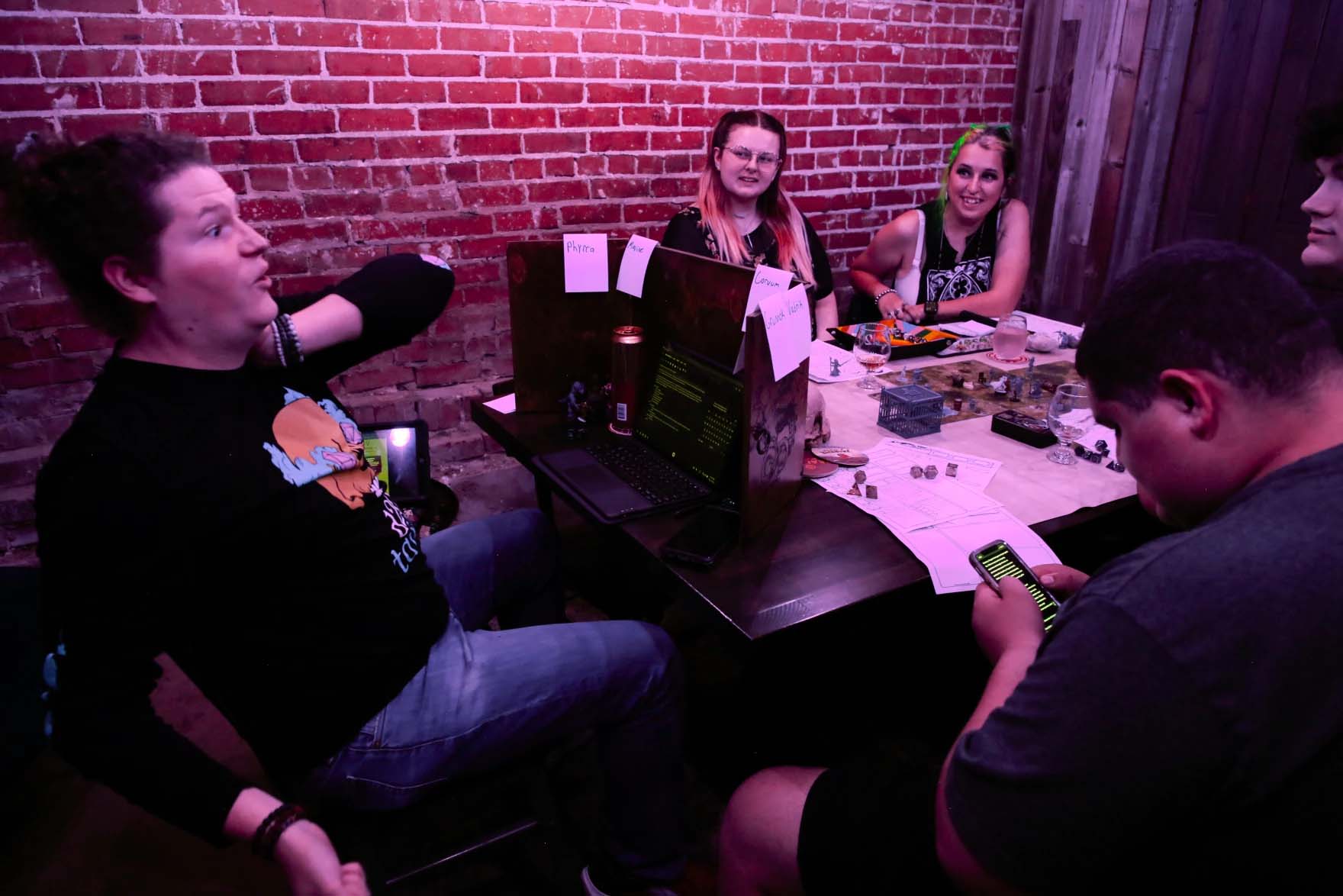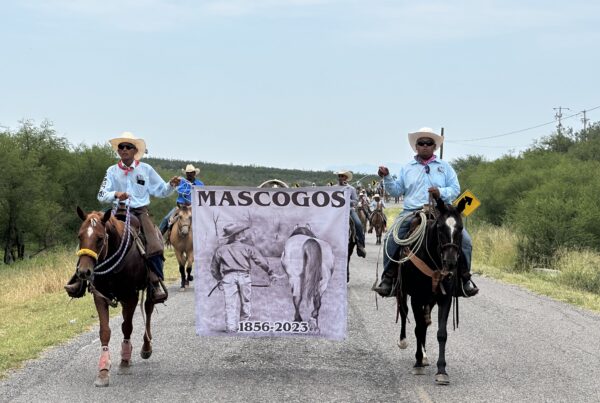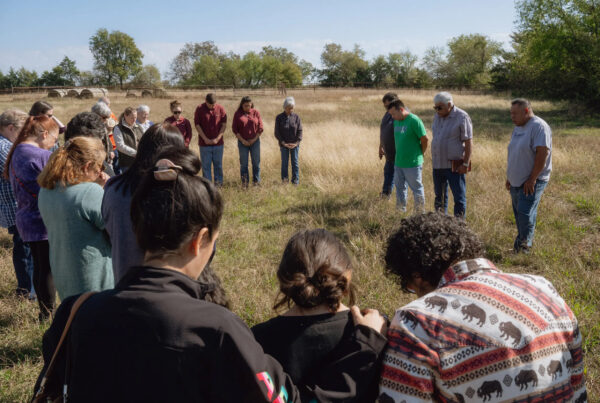From KERA News:
Dungeons & Dragons, a role-playing fantasy game that started in the 1970s, has filled parents’ basements with spell cards, mini figurines and battle maps for decades. But more recently, psychologists have turned to D&D as a tool to combat loneliness, anxiety and depression in teens and adults.
Dungeon masters, or DMs, create the story framework for players and guide them through a session. Each player makes a character with strengths, weaknesses, and motivations to fill out the adventuring party. Then, they go on quests: slaying dragons, finding treasure and building relationships along the way.
Kenneth Clevenger, who started playing back in 2015, said it’s almost like improv. He hosts weekly games D20 Tavern in Denton. It’s a bar with a floor-to-ceiling wall of board games, cozy couches and a roomy, atmospheric basement for group sessions.
“It’s just so much fun to inhabit someone else,” Clevenger said. “You are not Kenneth, the person that works at a bar, you are the dungeon master, or you are Olfred the Red, a barbarian with a heart of gold.”
He said it’s also a great way to meet new people.
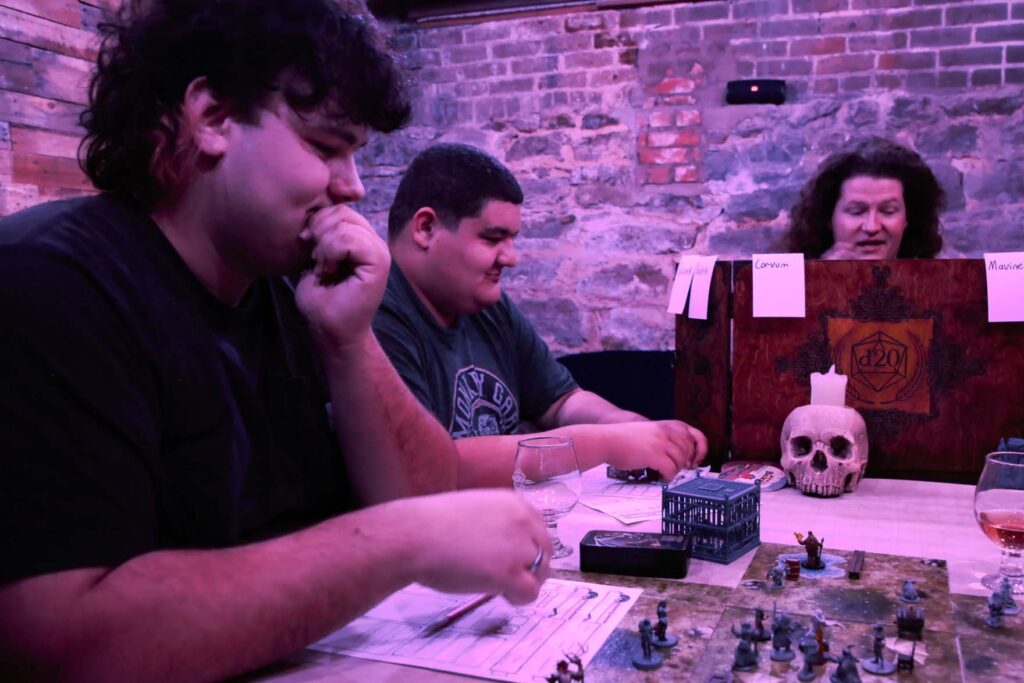
Players participate in a Dungeon & Dragons game Thursday, Oct. 12, 2023, at D20 Tavern in Denton.
Elena Rivera / KERA
“If you’re hopping into a group of strangers, you can make lifelong friendships through that,” Clevenger said. “Also, you get to roll very pretty click-clack math rocks, that are very nice to look at.”
Click-clack math rocks, also known as dice, help move the story along. Clevenger can ask players to roll their dice to sense people’s motivations, investigate strange caves, or get ready for combat. He can plan, but he said he never really knows how a session is going to turn out.
“I put the players in there and most of the time [they] are chaotic little gremlins and do stuff I would not expect them to do,” Clevenger said. “That [surprise] at what the players do at the table really gives me a lot of fulfillment.”
Characters can fail, and even die, depending on how well people roll. He said it’s led to some emotional moments.
“Innately, just over time, you’re always going to put a little bit of yourself in that character,” Clevenger said. “Yes, we’re playing a game…but maybe I put some angst or anger into my character that I was trying to process.
“In a safe space, using an avatar in the game world, you can process things a lot more safely, and amongst friends.”
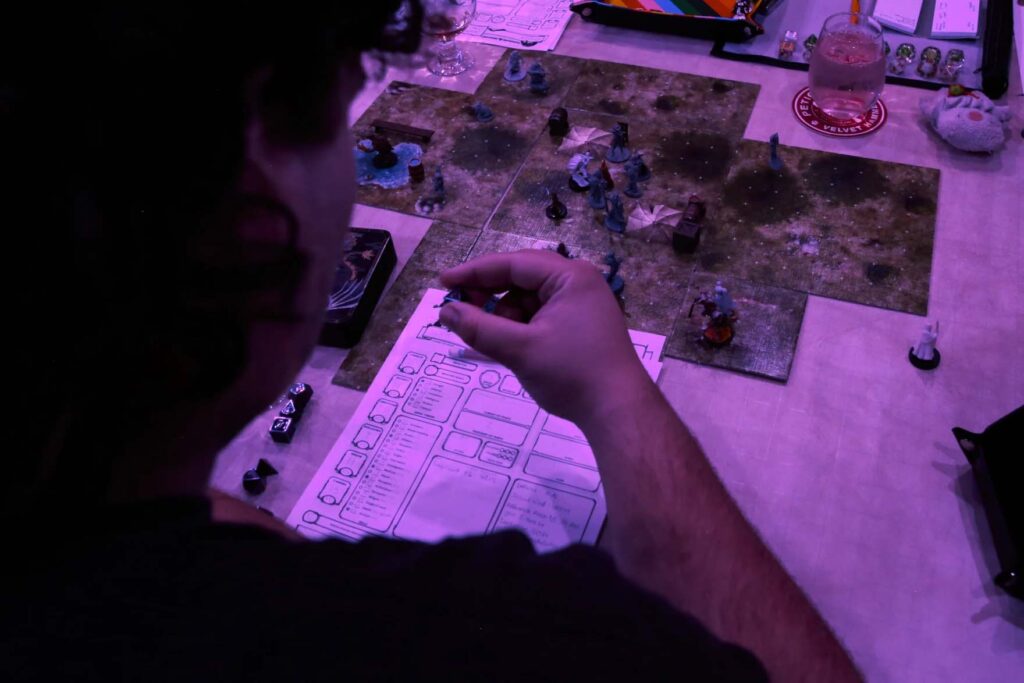
Players participate in a Dungeon & Dragons game Thursday, Oct. 12, 2023, at D20 Tavern in Denton.
Elena Rivera / KERA
Dungeons & Dragons as a psychology tool
That ability to process and connect is something that drew Cheryl Paberzs to D&D. She’s an individual and relationship therapist who was looking for a creative outlet when her friend introduced her to the game. Even two sessions in, Paberzs saw how it could be integrated into her practice.
“I was sitting there listening to everybody talk, and it just smacked me in the face,” she said. “Why is this not group therapy? This is amazing. I’m having so much fun doing it. But I’m learning so much about myself and about these people around the table. It just seemed like a no brainer at that point.”
Along with individual, couples and family counseling, she started hosting group therapy centered around D&D games for teens and adults. While D&D is not therapy in and of itself, Paberzs said it is a helpful tool.
It allowed her the space to use techniques like narrative therapy, which can help patients process and change stories they’ve internalized, and drama therapy, which can help patients regulate emotions and improve relationships through play. She said it’s all about rewriting your story.
“If you don’t like your story of your life, then you’re the author, you get to choose who the main characters are, and what your journey is,” Paberzs said. “And you can choose to rewrite your story in a way that fits best for you right now.”
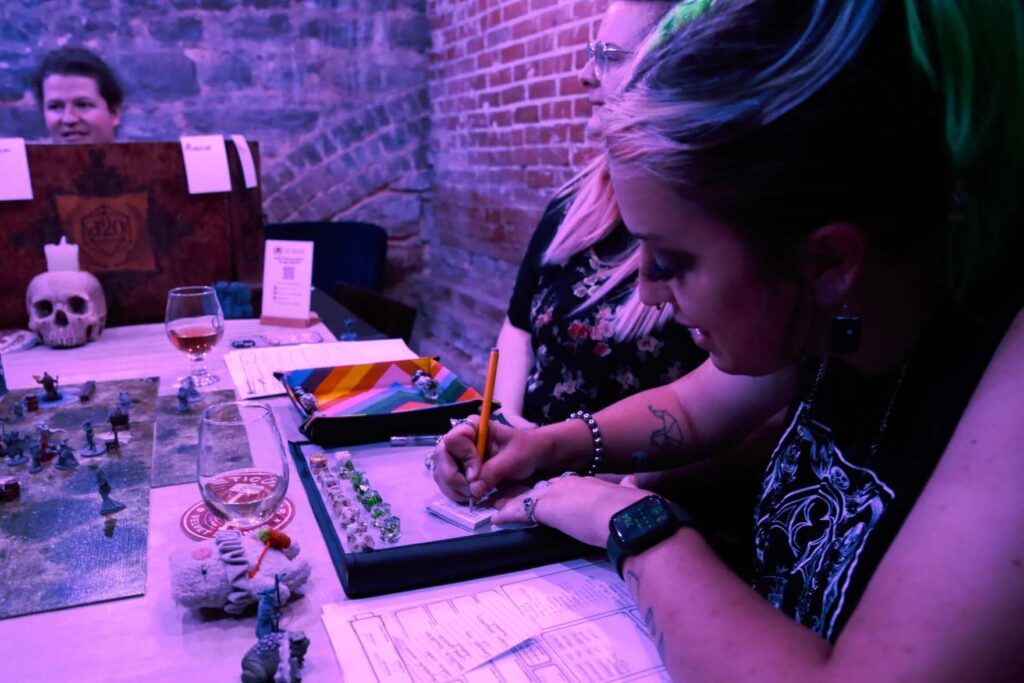
Gamers participate in a Dungeon and Dragons game Thursday, Oct. 12, 2023, at D20 Tavern in Denton.
Elena Rivera / KERA
ver the years, she’s seen the clients she’s worked with become more confident and more creative.
“I watched those kids grow up, and become friends, and start their own D&D campaigns outside of the group,” Paberzs said. “Kids who were very depressed and very socially anxious were starting to stand up for themselves in other areas of their life.”
Finding new ways to improve mental health is important to psychology professionals like Paberzs. The latest census data shows more than a third of Texas adults have symptoms of anxiety or depression. And a 2021 report from the U.S. Centers for Disease Control and Prevention showed 44% of Texas high school students felt sad or hopeless almost every day for two weeks or more. That’s slightly higher than the national average of 42%.
There’s a growing body of research that underlines the way D&D and other role-playing games improve mental health outcomes: Studies show these games can improve participants’ empathy, strategic thinking, moral development, and sense of social connection.
“All of that stuff that happens in the game, whether I’m there or not, but I can turn the heat up on those situations, and then we can process it afterwards,” Paberzs said. “Like, oh wow, you had a really great idea. And then you rolled a two. That’s really frustrating. But then, what happened afterwards? The group came in to help because it’s not just you alone out there.”
Processing grief and loss through Dungeons & Dragons
D&D can even help people process through feelings of grief, loss and death. That was Jamie Fipps’ experience. She’s played for almost a decade, including at D20 Tavern in Denton.
“It actually has become a fundamental part of my life where if I don’t know how to handle something, I give the problem to a character and see how they would go through it,” Fipps said. “You’re putting yourself in a different mindset. It’s really helped me to see from more than just one point of view for any given situation.”
She lost someone close to her shortly after she started playing, which is something she processed in the game.
“My way of coping was to create a D&D character based off how I was feeling at the moment,” Fipps said. “It was like a super anxious dude who had daddy issues. But it helped me grow through the fear and the guilt.”
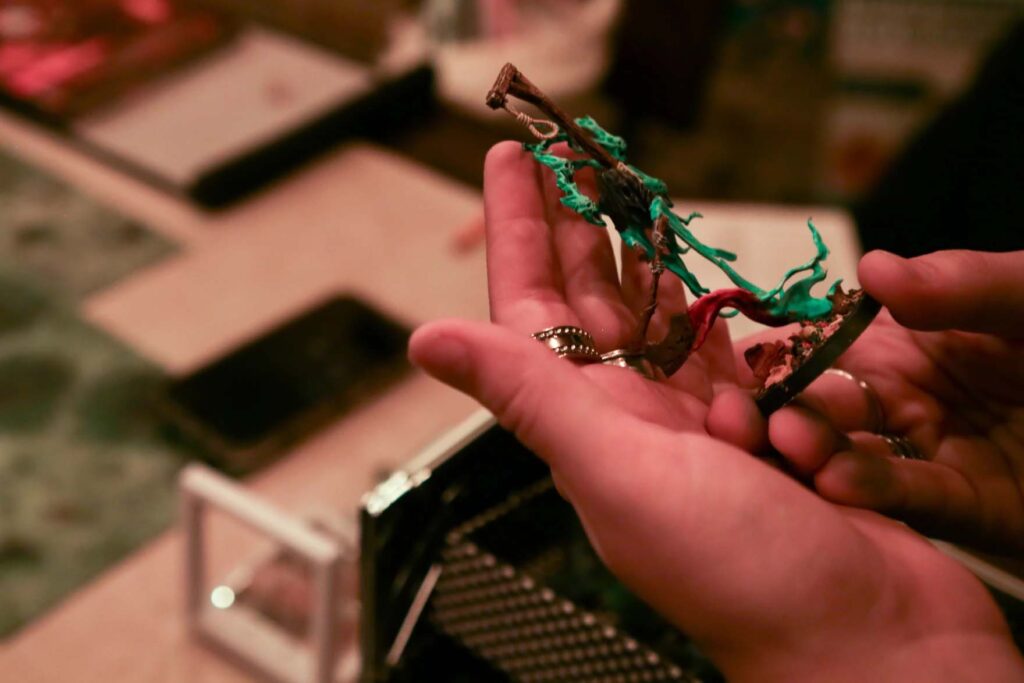
Gamers participate in a Dungeon and Dragons game Thursday, Oct. 12, 2023, at D20 Tavern in Denton.
Elena Rivera / KERA
Beyond emotional processing, she said D&D has helped her feel connected.
“It sounds really corny to be like, ‘Oh, well, I play D&D with my friends, and we’re all best friends in the game,’” Fipps said. “But legitimately, we are playing fully fleshed out people with emotions. And the fact that these people with such different ideals in game can still find connections and still be friends teaches you so much about the real world.”
Dungeon master Kenneth Clevenger said guiding the players through sessions has also helped him grow as a person.
“Playing D&D and having the experience of [being a dungeon master] for multiple years, you get a certain confidence talking with people,” he said. “[My] communication has definitely grown through that. Before I started, I would not [have been] able to handle compromise or group dynamics nearly as well.”
Getting into role-playing games, Clevenger said, has changed his life.
“And it could change yours if you just give it a try,” he said. “It might be weird at first doing voices and stuff. But after a while you feel weird not doing a silly voice.”


